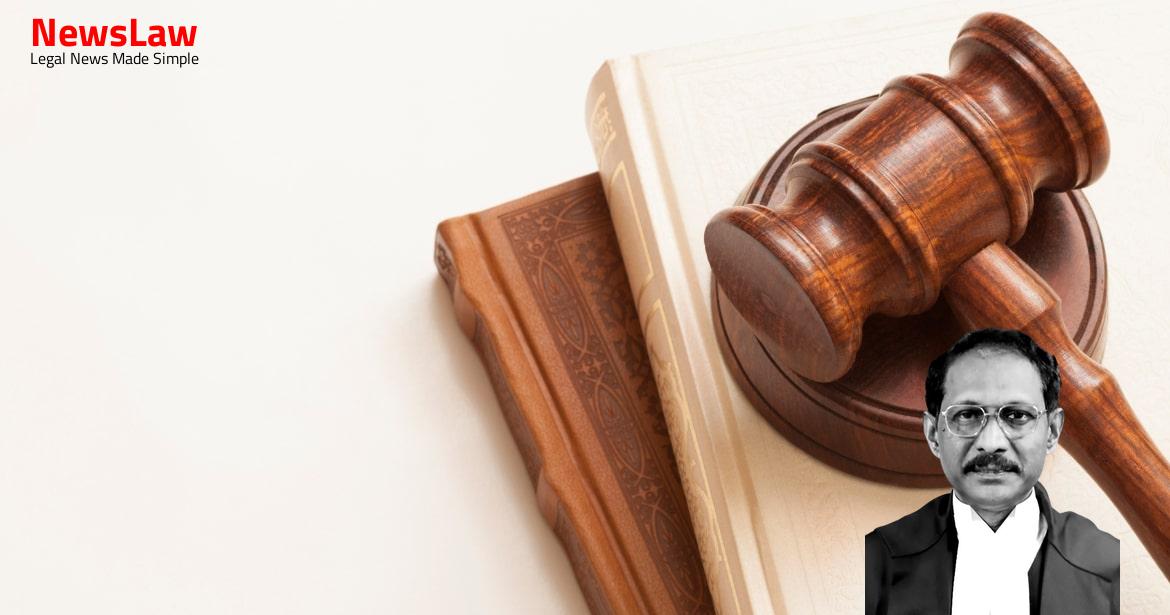Explore a detailed examination of the court’s legal analysis regarding promotion criteria in judicial appointments. Discover the intricacies of fair consideration and the application of merit-cum-seniority principles in the decision-making process. Delve into the nuances of this critical aspect of judicial appointments.
Facts
- Existing system of grading judicial officers lacked uniform set of rules or guidelines for appraisal committees to follow.
- Committees were urged to consider certain norms and performance indicators for greater uniformity, objectivity, transparency, and predictability.
- Formation of a Committee to address issues related to appointment criteria for District Judges.
- Rectification of the ‘no norm’ period by establishing threshold gradings in ACRs for eligibility consideration.
- High Court’s rejection of petitioner’s claim of being aggrieved due to non-communication of revised criteria before 2008-2009.
- Quashing of certain full court resolutions and Rule 27 of Delhi Higher Judicial Service Rules for appointment/promotion to the post of District Judge/Principal Judge, Family Court.
- Direction to frame specific Rules for promotion/appointment to the post of District and Sessions Judge/Principal Judge, Family Court.
- Instruction for respondent to consider the petitioner for recommendation for appointment/promotion as per entitlement.
- High Court’s broad laying down of norms and indicators for appointment criteria.
- Submission by the appellant to reconsider criteria laid down in impugned resolutions.
- The appellant became aware of the impugned resolutions in 2014 during the promotion consideration of judicial officers appointed in 2002.
- She secured the third position in her batch for direct selection to DHJS in 2002, later becoming second with a resignation.
- The appellant’s grievance was that junior candidates were appointed to the post of Principal Judge, Family Court instead of her despite being senior.
- She filed a writ petition seeking the quashing of specific notifications dated 15.1.2015 and 22.1.2015.
- The appellant argued that the communication of requirements for promotion was lacking prior to 2009, affecting her promotional prospects.
- She also contended that the impugned resolutions were violative of certain rules.
- No reply was received on her representation, but she was granted Super Time Scale by the High Court in December 2014.
- The basic facts related to the appellant’s case and her grievance were summarized after considering relevant rules and resolutions.
Also Read: Analysis of Suspicious Circumstances in Probate Proceedings
Issue
- Whether the appellant has been denied fair and reasonable consideration for promotion to the posts of District and Sessions Judge/ Principal Judge, Family Court due to the criteria in the resolutions.
- Whether the appellant suffered any prejudice in the matter of ACR gradings.
Also Read: Limitation Laws in Insolvency Proceedings
Arguments
- The petitioner argued that the right to be considered for promotion is a fundamental right and should be exercised fairly.
- Reference was made to Article 16 of the Constitution of India and the need for reasonable expectations in terms of service conditions for selection and promotion.
- The petitioner opposed the application of criteria similar to those of the Indian Administrative Service for judges, citing the decision in All India Judges Association v. Union of India.
- Citing the case of Dev Dutt v. Union of India, the petitioner argued that unequal gradings (A for juniors and B+ for seniors) amount to adverse ACR for the senior officers and that disclosure of all officers’ gradings would have allowed for fair redress.
- The petitioner’s grievance regarding not being informed of other officers’ ACR gradings was deemed without merit.
- Learned counsel contends appellant was informed of all her ACRs and accepted most for 2010-2014 without protest.
- Appellant did not pursue any case for upgradation of her ACRs and was satisfied with grading as ‘B+’.
- Respondent argues appellant is not entitled to relief as all promoted candidates had better ACR gradings.
- Distinguished Nirmal Chandra case with restructuring impact on promotion eligibility.
- Referenced Dev Dutt case within the argument.
Also Read: Interpretation of Tax Incentive Provision
Analysis
- Recruitment to the cadre of District Judge at Entry Level is done through regular recruitment.
- 65% of the posts are filled by promotion from Civil Judges (Senior Division) with at least ten years of service.
- 10% of the posts are filled by promotion based on merit through a limited competitive examination for Civil Judges (Senior Division) with a minimum of five years of qualifying service.
- 25% of the posts are filled by direct recruitment based on written and viva voce tests conducted by the High Court.
- Initial appointees stand confirmed from the date of appointment.
- All other candidates are on probation for two years upon appointment to a permanent post.
- Probation period can be extended up to three years on recommendation of the High Court.
- Services of a person on probation can be terminated without reason.
- After successful completion of probation, confirmation in the service is done by the Administrator in consultation with the High Court.
- The Constitution Bench highlighted the distinction between seniority and merit in promotions.
- Promotions to ‘selection grade posts’ are based on merit, not just seniority.
- The appellant’s case was duly considered for promotion along with others but was not promoted due to lacking the required ACR gradings.
- The High Court’s establishment provided norms for promotion based on the norms applicable to IAS officers in equivalent pay scales.
- The appellant’s grievance about non-communication of promotion criteria was deemed without merit.
- The High Court’s criteria for promotion were considered reasonable and necessary for the higher posts in question.
- The appellant’s lack of knowledge about the gradings of other officers did not impact the promotion process.
- The High Court’s phased implementation of revised promotion criteria was found to be fair and gradual.
- The requirement of ‘very good’ ACR gradings for promotions was gradually implemented and deemed reasonable.
- Comparative merit was emphasized for promotions, and the appellant was not adversely affected by the promotion criteria.
- Uniform norms for awarding ACR grades were not necessary, as the existing system was fair and applied uniformly to all officers.
- The appellant’s failure to challenge her gradings at the appropriate time led to the rejection of her grievance.
- The High Court’s modifications to promotion criteria were deemed appropriate and based on the recommendations of a committee.
- The residuary clause in Rule 27 allowed for the application of norms applicable to IAS officers for promotions within DHJS.
- The appellant’s argument regarding lack of awareness of revised criteria for promotions was deemed unsubstantiated.
- The system for awarding ACR grades was found to be equally applicable to all judicial officers and not discriminatory.
- The contesting respondent did not cause any prejudice to the appellant regarding ACR gradings.
- Communication of every entry in ACR to the employee is a fundamental legal requirement.
- The principle of merit-cum-seniority emphasizes merit and ability over seniority.
- Promotion to a selection post is not solely based on seniority but also on merit and suitability.
- Consultation with the High Court is necessary for appointments to certain posts.
- Non-communication of an entry in ACR is considered arbitrary and violates Article 14 of the Constitution.
- The distinction between the principles of merit-cum-seniority and seniority-cum-merit is highlighted.
- The Governor must consult with the High Court before making appointments to certain positions.
- The appellant, standing second in rank in her batch and never earning any adverse comment, expressed lamentation for not being promoted based on comparative merit.
- It is expected of her to understand that progression depends on merit, and only those higher in merit are promoted.
- Not being found eligible for promotion does not reflect adversely on her diligence and commitment.
- The denial of promotion, based on comparative merit, does not constitute a legal grievance for relief.
- The appellant’s claim of suffering prejudice due to denial of promotion is not supported by the evidence presented.
Decision
- The appeal fails and is dismissed with no order as to costs.
- The Committee recommended the implementation of revised criteria for the post of District Judge in a phased manner.
- The recommendations of the Committee were accepted by the Full Court in a meeting held on 27.01.2011.
Case Title: SUJATA KOHLI Vs. REGISTRAR GENERAL HIGH COURT OF DELHI (2020 INSC 364)
Case Number: C.A. No.-002374-002374 / 2020



